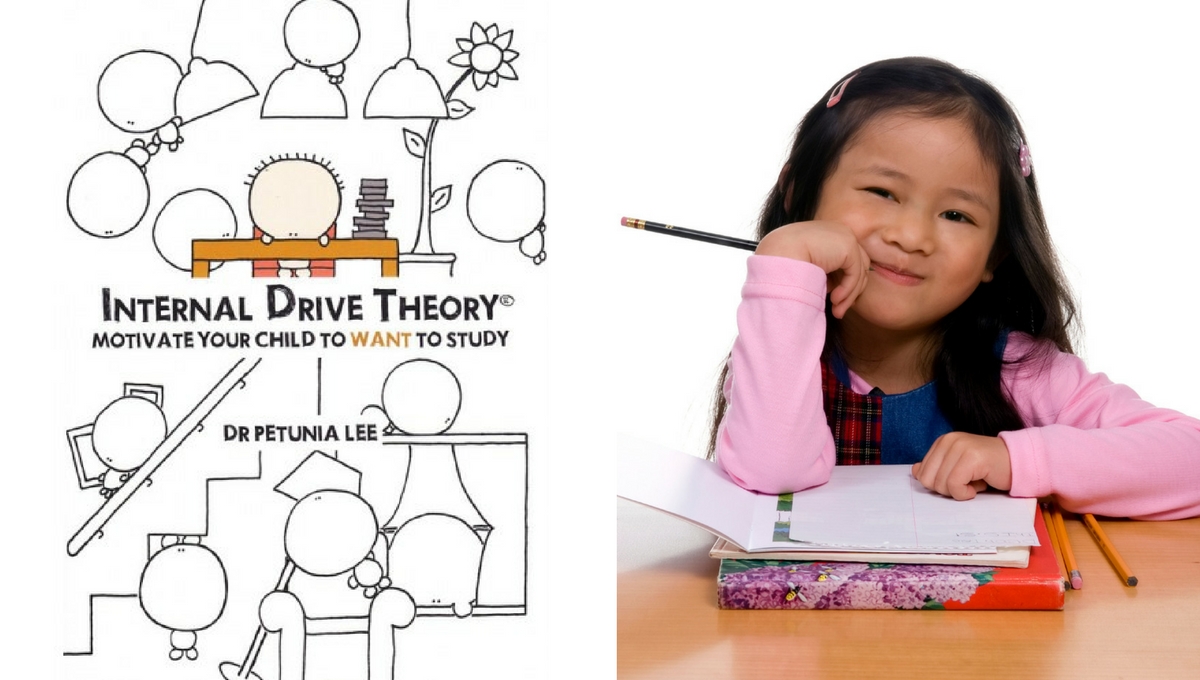Image of girl courtesy of Children’s Education Zone
Life as a parent of schooling kids isn’t a bed of roses.
After a hard day’s work, you’ve got to become teacher, coach and mentor to your precious ones. You need to find ways and means to nurture in him or her the joy of learning while fighting fatigue. Exams. Tests. Music. Dance. Sports. CCAs. The list appear to never end.
And then, of course, there is the dreaded four-letter word – PSLE – as well as other major exams such as the GCE ‘O’ and GCE ‘A’ Levels to contend with.
What can parents do to ignite the passion of their kids to study?
Human Motivation + Practical Tips
Enter Internal Drive Theory: Motivate Your Child to WANT to Study.
Blending theories in human motivation with practical tips and personal anecdotes, the book by motivational parenting blogger Dr Petunia Lee provides strategies to help parents motivate their kids to study.
Armed with a PhD in Business Studies and years of experience in management consulting, Dr Lee’s approaches are rooted in the fields of organisational psychology and behavioural economics.
Trademarked the “Internal Drive Theory”, the methods described in Internal Drive Theory instructs parents to raise their kids’ educational game from “level 1” (I study because my mother wants me to) to “level 3” (I study because I enjoy it).
Collectively, these techniques seek to raise internal drive, motivation and energy levels for kids in studying.
Emotional Support is Key
According to Dr Lee, providing strong emotional support to your child is critical. It is the source of emotional energy that can help your kid to overcome difficulties during his or her journey. This was highlighted in the chapter on “Emotional Connection”.
Having a strong emotional bond with your child further allows you to strengthen his or her self-efficacy. This is the ability to resolve issues using their own strength.
Beyond strengthening their self-efficacy, your children should also be better able to accomplish “difficult victories, and learn to see failure as an opportunity for learning.
Emotional support also helps you to nurture and develop a positive “self concept” in your child. When this occurs, you can stretch him or her to set and achieve seemingly “impossible” goals.
Random, Intermittent and Variable Reinforcement (RIVR)
To reinforce desired behaviours in your child, you are encouraged to use Random, Intermittent and Variable Reinforcement (RIVR).
These are unpredictable acts of intense expressions of love when your child does something good.
The flip side was what Dr Lee classifies as RIVP – Random, Intermittent and Variable Punishment. These acts of discipline should be carried out when your boy or girl fails to follow through.
According to the author, research over the years have shown that such interventions work better than anticipated ones.
Let Them Make Work Goal Choices
In the chapter on “Structured Choices”, you’re urged to give your child a work goal choice, allowing him or her to make an unconscious commitment to focus on that goal.
This has to be finely calibrated to the age of your child, as well as his/her prior training while providing lots of support.
Focus on Study Process, not Grades
We’re further taught in other chapters to “focus on study process, not grades”. Dr Lee wisely suggested that the right process accompanied by specific “informational feedback” helps a child to do better over the long run.
Here, it is important to control your emotions and not flare up if your child’s results are poor so long as he/she committed to the study process. In a way, you need to make a work convenant with your kid – a pact that you should keep as long as they fulfilled their end of the agreement.
Specific and Magnify Positive Behaviours
The final two chapters focused on the need to “specify and magnify” incidents of positive behaviours.
This runs contrary to what many of us parents are guilty of – namely fixating on the negative aspects of our child’s behaviours or results.
Make it Fun and Physical!
One of Dr Lee’s tips which we adopted was the one encouraging our son to engage in physical movements during the studying process.
Instead of remaining static during the process of studying, we allowed him to move around a bit so that he could experience a positive shot of endorphin and feel recharged during grueling sessions of study.
A Godsend for Frazzled Parents
Written in an easily digestible first person narrative, Internal Drive Theory was a godsend for frazzled parents like my wife and I.
What I especially like about the book were the personal anecdotes showcasing how Dr Lee inculcated internal drive in her son (codenamed “Little Boy”).
An especially memorable story was the one where Dr Lee “psyched” her son to memorise 2,000 word Chinese essays during the school holidays. This helped him to overcome his natural weakness as a “potato” child.
Another anecdote related how she helped Little Boy to erase his negative self concept of being a “poor student” to one who eventually topped his class.
While the lessons contained in the book were targeted at primary school kids, its universal principles can probably apply to students of all ages. Rooted in sound Human Resources (HR) and organisational psychology, these concepts applied equally well across multiple different contexts.
To purchase a copy of the book, check out this link from Dr Petunia Lee’s blog.

